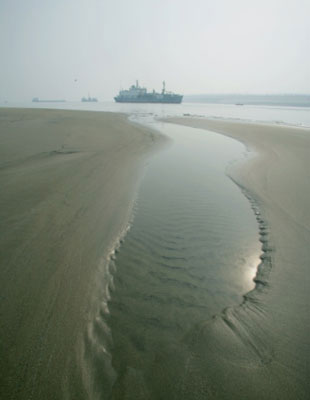The Yangtze River, China's longest river that normally carries abundant water resources, is suffering from a severe water shortage during this winter's longer dry season.
The Hankou hydrological station in Hubei Province recorded the Yangtze River's water level at 13.98 meters on January 8th. This was the record low level since recording began 142 years ago, the Changjiang Times reports.
Large amount of sediment can be sighted in the Hubei section of the Yangtze River.
Media reports have said the water shortage, mainly caused by the severe drought from autumn on the upper reaches, will continue to worsen in February.
More sandbars and islets can be seen on the riverbed since the first small amount of sediment was first sighted in 2005 in the Hubei section of the Yangtze River and the shortage of water in the main waterway has caused more frequent ship groundings.
In Hubei Province's Jianli County a farmer named Li Changmin has recently seen ships congested on the river along the section where he farms. Hundreds of ships are jammed up stretching several kilometers.
The farmer is cultivating garlic along the bank of the Yangtze in an area that had always been submerged in the past. He was not worried that the water would flood his garden.
He says the water is over 1000 meters away from his garden during this winter's dry season, and it will take months for the receding water to reach his garden again.
The river water shortage has left 200,000 residents in Jianli County with a drinking water shortage. The Jianli County Water Supply Company had to send its pumping ships far from the river bank to pump water.
Company workers say that before 1996 the Yangtze River dry season lasted only three months but now the dry season starts earlier and lasts longer. The lowest water level comes in February every year.
Experts have warned that because of the low water level, pollutants will be more concentrated during the dry season, which will make pollution problems more serious. The water shortage also threatens wildlife living in and around the river.
Liu Denghong, the director of the Chinese sturgeon research center in Yichang, Hubei Province, says that the low water level has reduced the living space for aquatic animals, and more ships and pollutants in the river will definitely threaten the animals' habitats.
Meanwhile, the low water level and the bare riverbed will cause a proliferation of field mice. A reoccurrence of Dongting Lake's 2007 mice disaster could happen again this year.
(CRI January 16, 2008)






